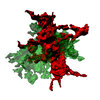Stopping Alzheimer's with a genetic switch
Researchers at the Freiburg University Medical Center find mechanism that reduces Alzheimer's-typical changes in a mouse model / To this end, they clarify the epigenetic control of immune cells in the brain / Study published in the journal ImmunityBy specifically switching off two genes, the progression of Alzheimer's disease can be halted and cognitive performance improved. This has now been shown by scientists at the University Medical Center Freiburg in mice that exhibited Alzheimer's-like changes in the brain. The researchers altered the genetic material of immune scavenger cells in the brain, known as microglial cells. As a result, the scavenger cells changed functionally and removed more of the harmful protein deposits that lead to brain damage in Alzheimer's disease. The two genes that were switched off are part of the epigenetic control system and regulate which genes are read and when and to what extent. Until now, little was known about this control in microglia. The findings of the Freiburg researchers could form the basis for new therapies for neurodegenerative diseases. The study was published on March 13, 2018 in the journal Immunity.
"The treated animals with Alzheimer's symptoms achieved significantly improved learning and memory performance. They almost reached the levels of healthy animals," says study leader Prof. Dr. Marco Prinz, Medical Director of the Institute of Neuropathology at the Freiburg University Medical Center. "By switching off the genes, the microglia scavenger cells took up more Alzheimer's-typical deposits in the brain, which significantly reduced the amount of these deposits." Apart from the desired increase in scavenging activity, the cells behaved normally.
Microglia tidy up the brain
Microglia are brain-specific macrophages or scavenger cells. They clear away non-functioning cells during the maturation of the brain and protect nerve cells from pathogens. However, it is also assumed that microglia play a decisive role in diseases such as Alzheimer's, multiple sclerosis or certain psychiatric disorders such as autism and schizophrenia. Incompletely activated microglia can contribute to brain damage, as can over-activated cells.
Scavenger cells eat better thanks to epigenetic changes
In addition to genetic information encoded in the cell's DNA, epigenetic changes play a decisive role in the development and regulation of cells. These have an influence on which DNA sections are read, when and to what extent. The team at the Institute of Neuropathology at the Freiburg University Medical Center led by Prof. Prinz, the scientist Dr. Moumita Datta and the neuropathologist Dr. Ori Staszewski have now switched off two of these epigenetic factors, so-called histone deacetylases (Hdac1 and Hdac2). "Epigenetics is of crucial importance for the development and function of microglial cells," says Prof. Prinz.
However, as the Freiburg researchers also discovered, the maturation of microglia is inhibited if the genes are already missing during brain maturation. "Without the function of these epigenetic factors, the number of microglia decreases during brain development and the cells do not mature normally," says Dr. Staszewski.
The work is part of the Collaborative Research Center "Medical Epigenetics (MedEp)" (SFB 992). The aim of this research initiative is to investigate fundamental mechanisms of epigenetic regulation and to transfer the findings to clinical applications.
Caption: Scavenger cells of the brain (microglia - in red) interact with deposits (amyloid plaques - in green) in the context of Alzheimer's disease and absorb them.
Image source: University Medical Center Freiburg
Original title of the study: Histone Deacetylases 1 and 2 Regulate Microglia Function during Development, Homeostasis, and Neurodegeneration in a Context-Dependent Manner.
DOI: 10.1016/j.immuni.2018.02.016
Link to the study: http://www.cell.com/immunity/fulltext/S1074-7613(18)30075-X
Further information: Institute of Neuropathology at the University Medical Center Freiburg
Contact:
Prof. Dr. Marco Prinz
Medical Director
Institute of Neuropathology
Freiburg University Medical Center
Phone: 0761 270-51060
marco.prinz@uniklinik-freiburg.de
Dr. Ori Staszewski
Specialist in Neuropathology
Institute of Neuropathology
Freiburg University Medical Center
Phone: 0761 270-51060
ori.staszewski@uniklinik-freiburg.de


